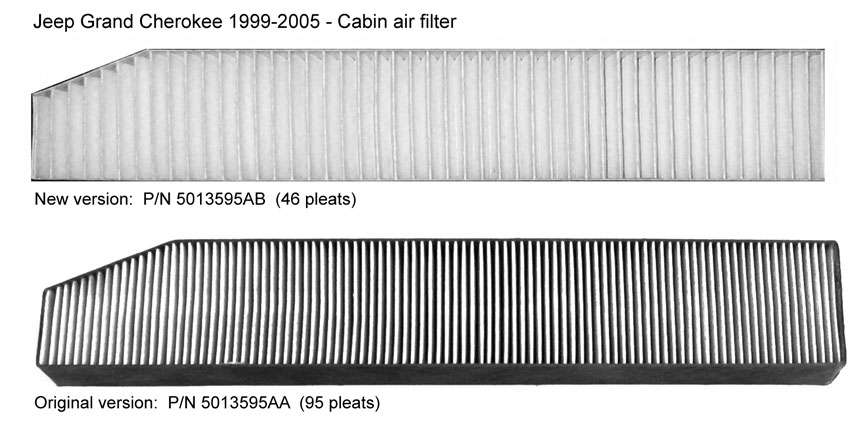
Cabin air filter, new version and original version
All Grand Cherokee WJ series models (1999-2004) and the new WK series (2005-up) feature a housing for installation of a cabin air filter. No models have ever come with the filter as standard, it must be purchased as a Mopar aftermarket accessory and installed under the front cowl. The filter allows a flow of unrestricted fresh air into the passenger cabin.
The cabin filter is a very worthwhile accessory. It removes solid particulates such as dust, pollen, mold, and bacteria from the air. Driving a vehicle with a clogged cabin air filter from dirt and debris drastically reduces the amount and quality of ambient air that can enter the interior and over time can lead to musty odors in your car as well as decreased HVAC performance. Mopar Cabin Air Filters remove up to 80% of particles one micron or larger. For reference, the human eye cannot detect particles under 20 to 25 microns.
The filter is easily installed underneath the cowl cover on the passenger side, accessible from under the hood. Once installed, all outside air coming through the AC/Heater vents is filtered. For installation, the factory inlet cover is discarded and the filter housing and filter installed in its place.
To keep cabin air quality at its best, filters should be replaced generally once a year or every 15,000 miles. Filters can be changed at 2 years/24,000 miles if mostly used in a cleaner environment (less driving on dusty roads and trails for example). Regularly changing cabin air filters also can reduce build-up of debris and bacteria on the evaporator core of your cars air conditioning and ventilation system, maximizing the life of the system. Cabin air filters stop most airborne particles, and to some extent are capable of reducing mild odors.
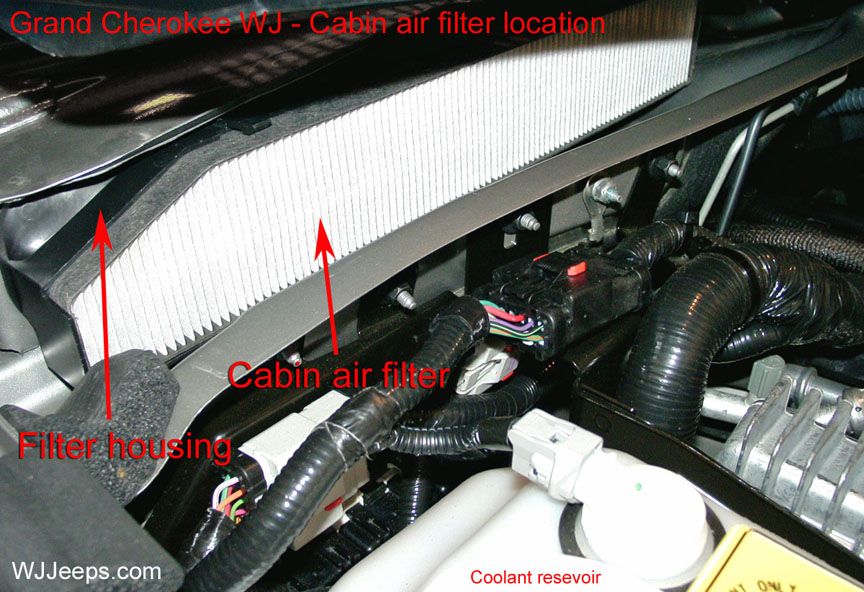
| WJ & WK Cabin air filter parts | ||
| Part name: “Cabin Air Kit” (1999-2009) |
Part number: 82208300 (supersedes 82204691) |
List price: $65.45 |
| Part name: “Replacement filter” (1999-2009) |
Part number: 5013595AB (supersedes 5013595AA) |
List price: $72.00 |
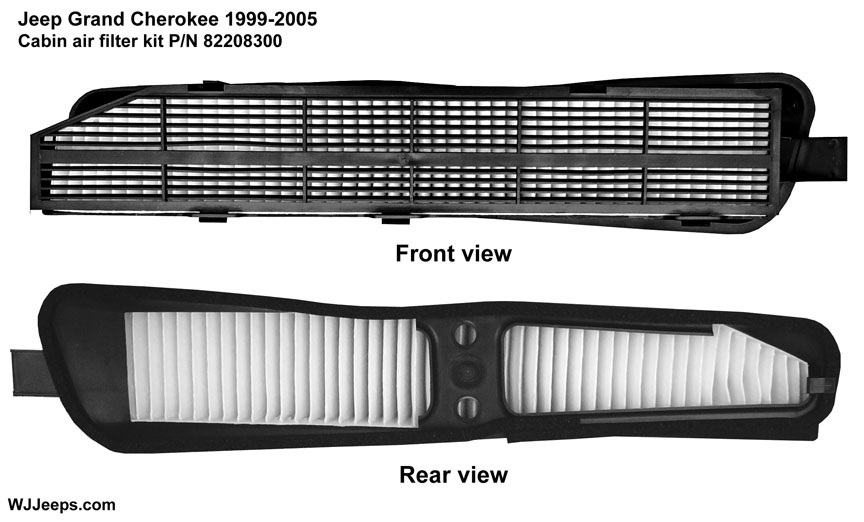
Cabin filter installation
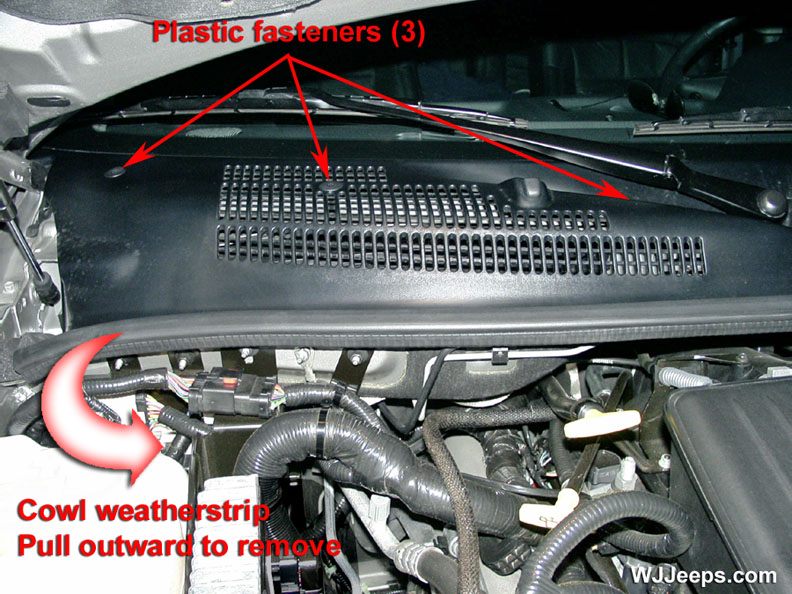
Note: Installation can be done WITHOUT removing the wiper arms:
1. Open hood.
2. Grasp the rubber cowl weatherstrip on the passenger side and pull it outward to remove it to about halfway across the firewall.
3. Remove the first 3 plastic fasteners that hold the cowl grill cover in place. It is best to get these “started” by gently lifting up on the cowl cover starting from the end. This will pop them up enough so that you can grab them by hand and remove them (Caution: the thin top edges of the plastic nuts can be very sharp).
4. The cowl cover can now be lifted up enough to reach in and remove the old plastic air inlet cover from the firewall. There are plastic tabs that hold the cover in place (see photo below). Pull out the thin side first which has the single clip. You then rock the cover back and forth to free up the center “rosebud” fasteners. Or, per the factory instructions you can cut out the plastic tabs that hold the rosebuds in place. Remove the cover and discard, it will not be reinstalled. If there is any dirt or debri inside the filter area this would be a good time to clean it out.
5. Insert the new plastic filter housing into the inlet opening and fasten it in place. Install the filter into the housing, inserting it carefully so that it does not bend too much as it is somewhat of a tight fit.
6. Install the filter cover over the filter. I had to bend/squeeze the top plastic locking tabs together a little in order for it to stay in place more firmly.
7. Put the plastic cowl fasteners back in place and make sure they are firmly seated. Re-install the rubber weatherstrip seal and you’re done!
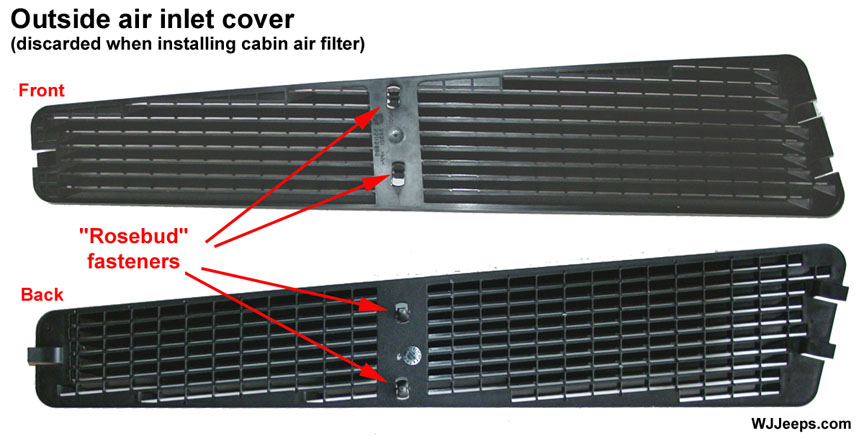
Factory air inlet cover, front and back views. This piece is removed and eliminated when installing the cabin air filter. The two “rosebuds” shown are the plastic fasteners that help secure the grill cover to the firewall.
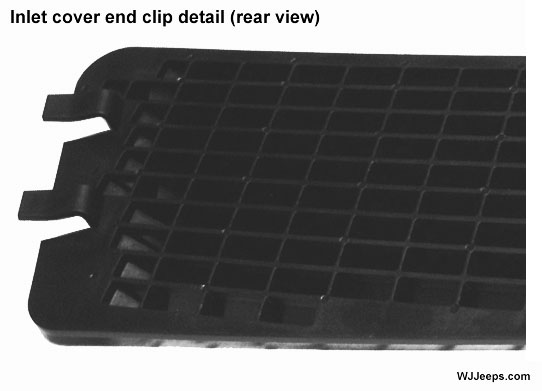
There are 3 plastic clips that hold the sides of the original factory inlet cover in place, two on the wide end (shown above) and one on the narrow end.
Vehicle air quality study
A study conducted by California’s South Coastal Air Quality Management District found that air inside a car may have up to 10 times the pollutants of outside air. Small particles of these pollutants, which include exhaust fumes, road dust, plant pollen and mold spores, enter a cars interior by way of the vehicles heating, air conditioning and ventilation (HVAC) system. Once inside, they become part of the air you breathe. With a cabin air filter, 90% of these contaminants can be prevented from entering your cars interior.

